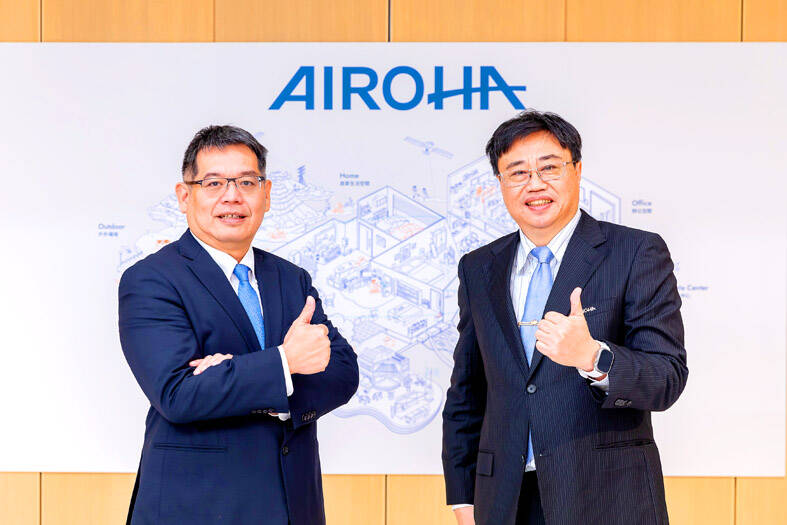Airoha Technology Corp (達發科技), the world’s No. 2 supplier of bluetooth chips used in Android-based true wireless stereo (TWS) earphones, yesterday said it aims to outgrow the industry next year, benefiting from market share gains and robust demand for bluetooth chips for headphones.
The company said it has set a goal to become the world’s top supplier of TWS bluetooth chips, challenging Qualcomm Inc’s leading position.
Airoha has gained the leadership position in gaming headphones, it said.

Photo courtesy of Airoha Technology Corp
The firm is 67 percent-owned by mobile phone chip supplier MediaTek Inc (聯發科).
Bluetooth for premium TWS earphones and GPS devices accounted for more than half of the company’s revenue in the third quarter, while fiber broadband and ethernet network chips made up 35 percent.
“We are optimistic about the outlook for bluetooth and GPS chips next year. With strong artificial intelligence [AI] capabilities, we believe we have a chance to see [revenue] trend up further,” Yuchuan Yang (楊裕全), a senior vice president in charge of Airoha’s wireless communications business group, told a media briefing in Taipei.
“The growth momentum next year will be very similar to this year’s,” Yang said. “The growth will be mostly driven by TWS earphone chips used in headsets.”
Yang declined to give a detailed revenue forecast for next year.
Based on a Global Market Insights projection, the world’s wireless stereo chip market is expected to expand at an annual rate of 20 percent from 2014 to 2032.
In the first 11 months of this year, Airoha’s revenue surged 39.48 percent year-on-year to NT$17.56 billion (US$540.62 million) from NT$12.59 billion in the same period last year.
The company counts the world’s premium headphone brands — Bang & Olufsen, GN Group and Sennheiser — among its customers.
To take advantage of growth opportunities, Airoha has identified TWS earphone chips with AI technology — with features such as adaptive noise suppression and voice-activated controls with improved natural-language processing — as a trend.
As the AI-enabled functions would require AI algorithms, the company uses low-voltage 12-nanometer chips made by Taiwan Semiconductor Manufacturing Co (TSMC, 台積電), Airoha vice president David Liang (梁仁昱) said.
Airoha is the first company to adopt TSMC’s low-voltage 12-nanometer chips, he said.
Another growth driver would be the emerging hearing aids market — standard bluetooth earbuds that amplify ambient sounds, the company said.
It is estimated that by 2050, more than 700 million people — or one in every 10 — would have hearing disabilities, Airoha said, citing a WHO report.
About 25 customers of Airoha have received approval from the US Food and Drug Administration for over-the-counter hearing aids, it said.

Taiwan Semiconductor Manufacturing Co (TSMC, 台積電) yesterday said that its investment plan in Arizona is going according to schedule, following a local media report claiming that the company is planning to break ground on its third wafer fab in the US in June. In a statement, TSMC said it does not comment on market speculation, but that its investments in Arizona are proceeding well. TSMC is investing more than US$65 billion in Arizona to build three advanced wafer fabs. The first one has started production using the 4-nanometer (nm) process, while the second one would start mass production using the

When an apartment comes up for rent in Germany’s big cities, hundreds of prospective tenants often queue down the street to view it, but the acute shortage of affordable housing is getting scant attention ahead of today’s snap general election. “Housing is one of the main problems for people, but nobody talks about it, nobody takes it seriously,” said Andreas Ibel, president of Build Europe, an association representing housing developers. Migration and the sluggish economy top the list of voters’ concerns, but analysts say housing policy fails to break through as returns on investment take time to register, making the

‘SILVER LINING’: Although the news caused TSMC to fall on the local market, an analyst said that as tariffs are not set to go into effect until April, there is still time for negotiations US President Donald Trump on Tuesday said that he would likely impose tariffs on semiconductor, automobile and pharmaceutical imports of about 25 percent, with an announcement coming as soon as April 2 in a move that would represent a dramatic widening of the US leader’s trade war. “I probably will tell you that on April 2, but it’ll be in the neighborhood of 25 percent,” Trump told reporters at his Mar-a-Lago club when asked about his plan for auto tariffs. Asked about similar levies on pharmaceutical drugs and semiconductors, the president said that “it’ll be 25 percent and higher, and it’ll

CHIP BOOM: Revenue for the semiconductor industry is set to reach US$1 trillion by 2032, opening up opportunities for the chip pacakging and testing company, it said ASE Technology Holding Co (日月光投控), the world’s largest provider of outsourced semiconductor assembly and test (OSAT) services, yesterday launched a new advanced manufacturing facility in Penang, Malaysia, aiming to meet growing demand for emerging technologies such as generative artificial intelligence (AI) applications. The US$300 million facility is a critical step in expanding ASE’s global footprint, offering an alternative for customers from the US, Europe, Japan, South Korea and China to assemble and test chips outside of Taiwan amid efforts to diversify supply chains. The plant, the company’s fifth in Malaysia, is part of a strategic expansion plan that would more than triple